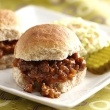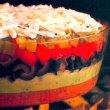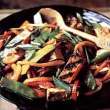COOKING DRIED BEANS
TIPS FOR PREVENTING GAS
COLORADO STATE UNIVERSITY
COOPERATIVE EXTENSION:
Dry beans also are easy to prepare. They have, however, gained a reputation for being hard to digest and are known to cause a little flatulence or "gas." To help eliminate this problem, try cooking dried beans like this:
Soak dried beans overnight or at least for five hours. (This isn't necessary for dried peas and lentils.) Discard the water, add fresh water, cook for half hour and discard the water. Rinse beans thoroughly until water runs clear. Cover with fresh water and cook until tender. This method will help prevent "gas," which is caused by complex carbohydrates (raffinose sugars) that are not broken down in digestion. When they ferment in the large intestine, they produce carbon dioxide, hydrogen and a little hydrogen sulfide, that can cause gas.
If you want to include more beans in your diet, but increase your "comfort zone" with them, you should:
Start slowly by eating beans only a couple of times a week at first. This helps your body adjust to digesting them.
Drink lots of fluids to help the digestive system handle the increased dietary fiber.
Soak and cook thoroughly to eliminate the raffinose sugars that make beans hard to digest.
Other helpful hints for cooking beans are to add one tablespoon of oil to beans to keep the foam down while cooking. If your recipe calls for tomatoes, lemon juice, vinegar or other acidic foods, add these items after beans are tender. The presence of acid keeps beans from softening.
Also, contrary to advice you may have heard, DO NOT use baking soda when cooking beans. It robs them of their nutritional value.
USA WEEKEND MAGAZINE:
Soak and rinse beans several times to remove gas-producing sugars, USDA researchers advise. Always change the water before cooking.
Adding garlic and ginger, dried or fresh, to a cooking pot of beans can reduce the beans' gas-producing properties, according to research in India.
Supermarket anti-gas products, in pill or powder such as Beano and BeSure, can help.
WASHINGTON STATE UNIVERSITY:
Beans are full of starch including some that do not digest easily. Digesting this starch can produce gas, giving rise to the rhyme Beans, beans, the musical fruit.... There are several ways to quiet this music so you can enjoy the health benefits of beans.
Gradually increase the amount of beans you eat, so your digestive system can adjust.
Soak beans overnight then discard the soaking water. Some, but not all, of the hard-to-digest carbohydrates dissolve into the water and are then poured off.
This quick method also helps reduce gas: Cover beans with water. Bring to a boil for 2-3 minutes. Let set at least one hour, but preferably four hours. The longer beans soak, the more gas-causing substances are removed.
Try Beano, a product found in the pharmacy section or on the bean aisle of the grocery store. Its natural enzymes help digest gas-producing carbohydrates.
TIPS FOR PREVENTING GAS
COLORADO STATE UNIVERSITY
COOPERATIVE EXTENSION:
Dry beans also are easy to prepare. They have, however, gained a reputation for being hard to digest and are known to cause a little flatulence or "gas." To help eliminate this problem, try cooking dried beans like this:
Soak dried beans overnight or at least for five hours. (This isn't necessary for dried peas and lentils.) Discard the water, add fresh water, cook for half hour and discard the water. Rinse beans thoroughly until water runs clear. Cover with fresh water and cook until tender. This method will help prevent "gas," which is caused by complex carbohydrates (raffinose sugars) that are not broken down in digestion. When they ferment in the large intestine, they produce carbon dioxide, hydrogen and a little hydrogen sulfide, that can cause gas.
If you want to include more beans in your diet, but increase your "comfort zone" with them, you should:
Start slowly by eating beans only a couple of times a week at first. This helps your body adjust to digesting them.
Drink lots of fluids to help the digestive system handle the increased dietary fiber.
Soak and cook thoroughly to eliminate the raffinose sugars that make beans hard to digest.
Other helpful hints for cooking beans are to add one tablespoon of oil to beans to keep the foam down while cooking. If your recipe calls for tomatoes, lemon juice, vinegar or other acidic foods, add these items after beans are tender. The presence of acid keeps beans from softening.
Also, contrary to advice you may have heard, DO NOT use baking soda when cooking beans. It robs them of their nutritional value.
USA WEEKEND MAGAZINE:
Soak and rinse beans several times to remove gas-producing sugars, USDA researchers advise. Always change the water before cooking.
Adding garlic and ginger, dried or fresh, to a cooking pot of beans can reduce the beans' gas-producing properties, according to research in India.
Supermarket anti-gas products, in pill or powder such as Beano and BeSure, can help.
WASHINGTON STATE UNIVERSITY:
Beans are full of starch including some that do not digest easily. Digesting this starch can produce gas, giving rise to the rhyme Beans, beans, the musical fruit.... There are several ways to quiet this music so you can enjoy the health benefits of beans.
Gradually increase the amount of beans you eat, so your digestive system can adjust.
Soak beans overnight then discard the soaking water. Some, but not all, of the hard-to-digest carbohydrates dissolve into the water and are then poured off.
This quick method also helps reduce gas: Cover beans with water. Bring to a boil for 2-3 minutes. Let set at least one hour, but preferably four hours. The longer beans soak, the more gas-causing substances are removed.
Try Beano, a product found in the pharmacy section or on the bean aisle of the grocery store. Its natural enzymes help digest gas-producing carbohydrates.
MsgID: 0076133
Shared by: Betsy at Recipelink.com
In reply to: ISO: cooking dried beans
Board: Cooking Club at Recipelink.com
Shared by: Betsy at Recipelink.com
In reply to: ISO: cooking dried beans
Board: Cooking Club at Recipelink.com
- Read Replies (3)
- Post Reply
- Post New
- Save to Recipe Box
| Reviews and Replies: | |
| 1 | ISO: cooking dried beans |
| Evelyn - Sheffield, AL | |
| 2 | Recipe: Cooking Dried Beans - Tips for Preventing Gas |
| Betsy at Recipelink.com | |
| 3 | Thank You: Cooking Dried Beans - Tips |
| majicdanser, fullerton, ca | |
| 4 | You're welcome! (nt) |
| Betsy at Recipelink.com | |
ADVERTISEMENT
UPLOAD AN IMAGE
Allowed file types: .gif .png .jpg .jpeg
Allowed file types: .gif .png .jpg .jpeg
POST A REPLY
Post a Request - Answer a Question
Share a Recipe
Thank You To All Who Contribute
Post a Request - Answer a Question
Share a Recipe
Thank You To All Who Contribute
POST A NEW MESSAGE
Post a Request - Answer a Question
Share a Recipe
Thank You To All Who Contribute
Post a Request - Answer a Question
Share a Recipe
Thank You To All Who Contribute
































































